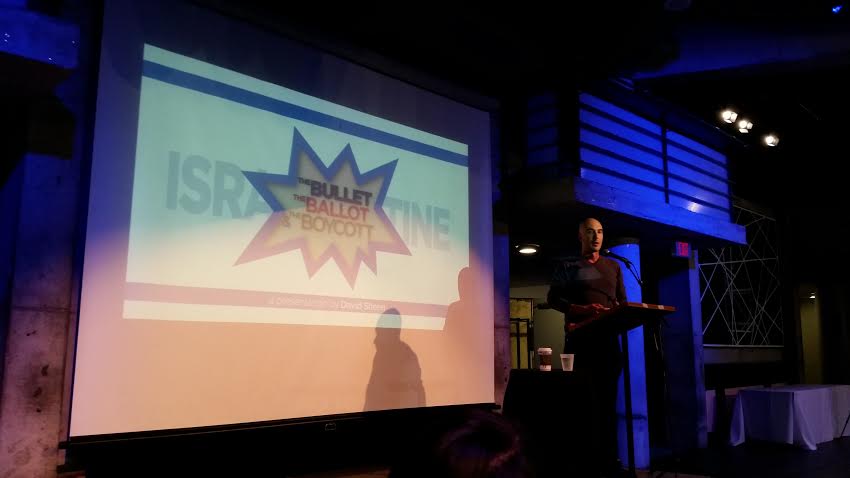While any mention of “boycott” in discussions about Israeli-Palestinian could be perceived as a reference to the global Boycott, Divestment, and Sanctions movement, which many critics claim is a racist, York alumnus and Israel-based journalist David Sheen spoke on campus about a very different boycott that is allegedly already in place in Israel. He claims it is one that targets Palestinians and other non-Jewish minority groups through what Sheen described as “racist rhetoric and policies.”
The event, “Racism in Israel: The Bullet, the Ballot, and the Boycott” was hosted by Students Against Israeli Apartheid at York and held in The Underground. Relying on primary sources such as quoted statements from Israeli politicians, Sheen delivered a presentation which broke down his list of examples of Israeli racism into categories.
The categories included race-based discrimination in citizens’ access to residence of their choice, the distribution of funding to non-Jewish villages and towns, the equality of opportunity in the labour market, and racist comments in the Knesset, which is Israel’s parliament.
“In Israel, almost all housing is segregated,” says Sheen. “Almost all villages or towns are either Jewish or Arab, and so, because the Israeli government boycotts its non-Jewish towns and villages and gives them far less funding, they often don’t have the room to expand and grow and have enough housing for their growing population.”
He speaks about an unfair distribution of funding which keeps non-Jewish villages and towns from developing and maintaining recreational amenities, such as public swimming pools.
A small number of cities are home to a mixed population, Sheen concedes, but this does not guarantee the non-Jewish citizens living there respite from the racism of local government officials.
He referred to the example of Upper Nazareth, which is home to a substantial Palestinian minority. The mayor of the town, Shimon Gapso, refused to allow the establishment of an Arab-language school. “Upper Nazareth is a Jewish city and it’s important that it remains so,” Gapso claimed in the op-ed he wrote for Haaretz, defending his position. “If that makes me a racist, then I’m a proud offshoot of a glorious dynasty of ‘racists’.”
Sheen spoke about Gapso’s campaign for re-election in 2013, where supporters distributed posters that said, “Upper Nazareth will be Jewish forever; no more shutting our eyes, no more grabbing on to the law allowing every citizen to live where they want. This is the time to defend our home.”
Sheen discussed racial discrimination in Israel’s labour market as well. “It’s not uncommon to walk down a street in Israel and see signs like this,” he claims, referring to a public job posting in which an employer clearly says that they are looking only for Jewish employees to perform a manual labour job, a job where a person of any other race could perform equally as well.
The idea from the employers’ perspective, Sheen claims, is to appeal to the customers’ presumed racist nature, and so they are encouraged to purchase a business’s services with the guarantee that only Jewish labourers will ever benefit from the transaction. At the same time, said Sheen, many people in Israel have advocated a boycott of Arab businesses and products, including Yair Netanyahu, the son of Israeli PM Benjamin Netanyahu.
Sheen also discussed instances of racism in the Israeli parliament, such as the fact that elected Palestinian political representatives in the Knesset are banned from having meetings with foreign diplomats.
“This kind of racism goes on and no one bats an eye,” says Sheen.
“Palestine-Israel is a difficult, multifaceted issue that is mired in misinformation,” says fourth-year political science student Younus Imam. “It is important for students to be aware of this issue in order to responsibly engage in the debate and contribute to the possibility of peace in the region.”
Hussam Munir
Sports and Health Editor


